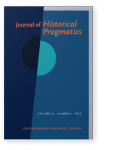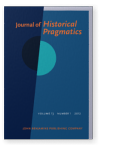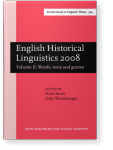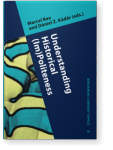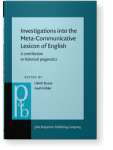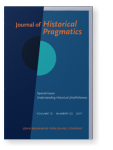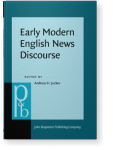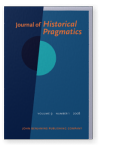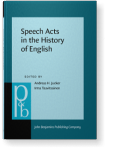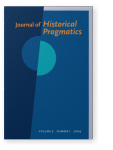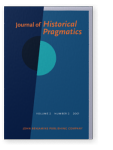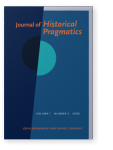Thomas Kohnen
List of John Benjamins publications for which Thomas Kohnen plays a role.
2022 Chapter 9. Speech acts in the history of English: Gaps and paths of evolution English Historical Linguistics: Historical English in contact, Los, Bettelou, Chris Cummins, Lisa Gotthard, Alpo Honkapohja and Benjamin Molineaux (eds.), pp. 165–180 | Chapter
Throughout the history of the English language we find different sets of speech-act verbs which seem to reflect the most prominent speech acts. These inventories change across the periods of the English language, revealing remarkable lexical gaps. This chapter investigates some of these gaps and… read more
2012 Review of Cummings (2010): The Pragmatics Encyclopedia Journal of Historical Pragmatics 13:1, pp. 164–168 | Review
2012 Historical text linguistics: Investigating language change in texts and genres English Historical Linguistics 2008: Selected papers from the fifteenth International Conference on English Historical Linguistics (ICEHL 15), Munich, 24-30 August 2008, Sauer, Hans and Gaby Waxenberger (eds.), pp. 167–188 | Article
This paper advocates a systematic distinction between the fields of Historical Pragmatics and Historical Discourse Analysis on the one hand and Historical Text Linguistics on the other. Building on basic distinctions introduced in Brinton (2001), it traces three major perspectives of research… read more
2012 Understanding Anglo-Saxon “politeness”: Directive constructions with ic wille / ic wolde Understanding Historical (Im)Politeness: Relational linguistic practice over time and across cultures, Bax, Marcel and Dániel Z. Kádár (eds.), pp. 227–250 | Article
ic willeic woldeic wolde þæt þu me sædestic willeic woldeDictionary of Old English Corpushumilitas
Thus, this paper, on the one hand, confirms the picture of Anglo-Saxon England as a world “beyond politeness” (Kohnen 2008a); on the other hand, it also adds important aspects that may improve our… read more
2012 Performative and non-performative uses
of speech-act verbs in the history of English Investigations into the Meta-Communicative Lexicon of English: A contribution to historical pragmatics, Busse, Ulrich and Axel Hübler (eds.), pp. 207–222 | Article
2011 Understanding Anglo-Saxon “politeness”: Directive constructions with ic wille / ic wolde Understanding Historical (Im)Politeness, Bax, Marcel and Dániel Z. Kádár (eds.), pp. 230–254 | Article
ic wille ic wolde ic wolde þæt þu me sædest ic wille ic wolde Dictionary of Old English Corpus humilitas
Thus, this paper, on the one hand, confirms the picture of Anglo-Saxon England as a world “beyond politeness” (Kohnen 2008a); on the other hand, it also adds important aspects that may… read more
2009 Religious language in early English newspapers? Early Modern English News Discourse: Newspapers, pamphlets and scientific news discourse, Jucker, Andreas H. (ed.), pp. 73–89 | Article
2008 Linguistic politeness in Anglo-Saxon England? A study of Old English address terms Journal of Historical Pragmatics 9:1, pp. 140–158 | Article
This paper investigates Anglo-Saxon address terms against the background of politeness and face work. Using the Dictionary of Old English Corpus, it examines the most prominent Old English terms of nominal address associated with polite or courteous behaviour, their distribution, the typical… read more
2008 Tracing directives through text and time: Towards a methodology of corpus-based diachronic speech-act analysis Speech Acts in the History of English, Jucker, Andreas H. and Irma Taavitsainen (eds.), pp. 295–310 | Article
2008 Directives in Old English: Beyond politeness? Speech Acts in the History of English, Jucker, Andreas H. and Irma Taavitsainen (eds.), pp. 27–44 | Article
2007 'Connective profiles' in the history of English texts: Aspects of orality and literacy Connectives in the History of English, Lenker, Ursula and Anneli Meurman-Solin (eds.), pp. 289–308 | Article
2004 “Let mee bee so bold to request you to tell mee”: Constructions with let me and the history of English directives Journal of Historical Pragmatics 5:1, pp. 159–173 | Article
Constructions with let me (e.g. let me see, let me tell you, let me think what to do next) are usually analysed as so-called periphrastic imperatives. This paper shows that most of the examples found in Middle English and Early Modern English corpora cannot be understood in this sense but must be… read more
2000 Explicit performatives in Old English: A corpus-based study of directives Journal of Historical Pragmatics 1:2, pp. 301–321 | Article
This article deals with directive performatives in Old English. Using the Old English section of the Helsinki Corpus, it examines their frequency, their distribution across text types and their major functions. In addition, the data are compared with their Latin sources and with the frequency… read more

